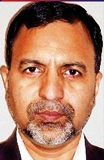
New Delhi, October 19: The Supreme Court on Friday granted bail to Syed Mohammad Ahmed Kazmi, who has been behind bars since March 6 in the Israeli diplomat car attack case.
A bench headed by Chief Justice Altamas Kabir granted bail and directed him to deposit his passport before the concerned authority.
Kazmi has also been restrained from going abroad.
The bench passed the order on a plea filed by Kazmi challenging the Delhi High Court's order which had dismissed his plea for bail.
Kazmi, who claims to have been writing for an Iranian publication, was picked up after a probe showed that he had been in touch with the suspect who is believed to have stuck the magnetic bomb on Israeli diplomat Tal Yehoshua's car on February 13, according to the police.
Kazmi is alleged to have helped the suspect in conducting the recce of the Israeli Embassy to keep a tab on arrival and departure of diplomats.
Israeli diplomat Tal Yehoshua Koren, 42, wife of Israeli Defence Attache Colonel Yossi Refaelov and an Indian driver of the embassy vehicle, were among four people injured in the blast caused by the magnetic bomb stuck to her vehicle by a motorcycle-borne person.





Comments
Add new comment